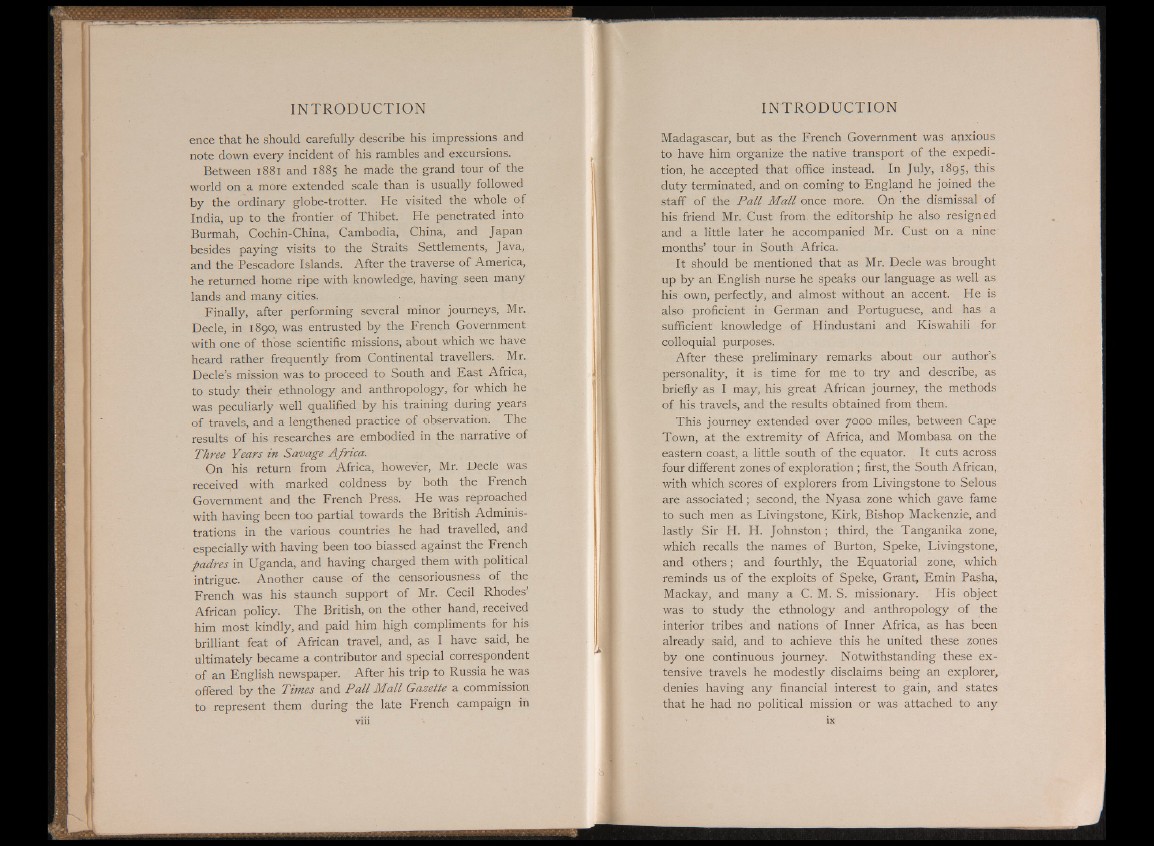
ence that he should carefully describe his impressions and
note down every incident of his rambles and excursions.
Between 1881 and 1885 he made the grand tour of the
world on a more extended scale than is usually followed
by the ordinary globe-trotter. He visited the whole of
India, up to the frontier of Thibet. He penetrated into
Burmah, Cochin-China, Cambodia, China, and Japan
besides paying visits to the Straits Settlements, Java,
and the Pescadore Islands. After the traverse of America,
he returned home ripe with knowledge, having seen many
lands and many cities.
Finally, after performing several minor journeys, Mr.
Decle, in 1890, was entrusted by the French Government
with one of those scientific missions, about which we have
heard rather frequently from Continental travellers. Mr.
Decle’s mission was to proceed to South and East Africa,
to study their ,ethnology and anthropology, for which he
was peculiarly well qualified by his training during years
of travels, and a lengthened practice of observation. The
results of his researches are embodied in the narrative of
Three Years in Savage Africa.
On his return from Africa, however, Mr. Decle was
received with marked coldness by both the French
Government and the French Press. He was reproached
with having been too partial towards the British Administrations
in the various countries he had travelled, and
especially with having been too biassed against the French
padres in Uganda, and having charged them with political
intrigue. Another cause of the censoriousness of the
French was his staunch support of Mr. Cecil Rhodes’
African policy. The British, on the other hand, received
him most kindly, and paid him high compliments for his
brilliant feat of African travel, and, as I have said, he
ultimately became a contributor and special correspondent
of an English newspaper. After his trip to Russia he was
offered by the Times and P a ll M all Gazette a commission
to represent them during the late French campaign in
viii
Madagascar, but as the French Government was anxious
to have him organize the native transport of the expedition,
he accepted that office instead. In July, 1895, this
duty terminated, and on coming to England he joined the
staff of the P a ll M all once more. On the dismissal of
his friend Mr. Cust from, the editorship he also resigned
and a little later he accompanied Mr. Cust on a nine-
months’ tour in South Africa.
It should be mentioned that as Mr. Decle was brought
up by an English nurse he speaks our language as well as
his own, perfectly, and almost without an accent. He is
also proficient in German and Portuguese, and has a
sufficient knowledge of Hindustani and Kiswahili for
colloquial purposes.
After these preliminary remarks about our author’s
personality, it is time for me to try and describe, as
briefly as I may, his great African journey, the methods
of his travels, and the results obtained from them.
This journey extended over 7000 miles, between Cape
Town, at the extremity of Africa, and Mombasa on the
eastern coast, a little south of the equator. It cuts across
four different zones of exploration ; first, the South African,
with which scores of explorers from Livingstone to Selous
are associated; second, the Nyasa zone which gave fame
to such men as Livingstone, Kirk, Bishop Mackenzie, and
lastly Sir H. H. Johnston ; third, the Tanganika zone,
which recalls the names of Burton, Speke, Livingstone,
and others; and fourthly, the Equatorial zone, which
reminds us of the exploits of Speke, Grant, Emin Pasha,
Mackay, and many a C. M. S. missionary. His object
was to study the ethnology and anthropology of the
interior tribes and nations of Inner Africa, as has been
already said, and to achieve this he united these zones
by one continuous journey. Notwithstanding these extensive
travels he modestly disclaims being an explorer,
denies having any financial interest to gain, and states
that he had no political mission or was attached to any
ix